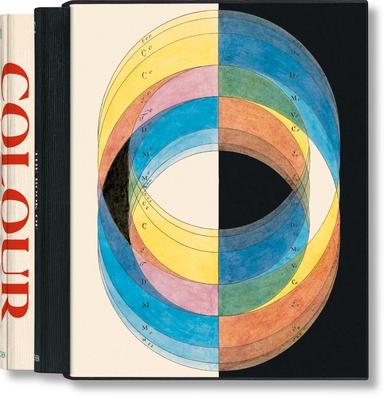The earliest forms of human creativity - in carvings, markings, and cave paintings - bear witness to humanity's engagement with color. Almost as old as these examples is the desire to assign structure, order, and meaning to this universal yet elusive concept, and it is this fascination that unites the works compiled in this expansive edition.
Gathering over 65 rare books and manuscripts from a wealth of institutions, including the most distinguished color collections worldwide, The Book of Colour Concepts takes the reader on a chromatic odyssey across four centuries and over 1,000 images of luscious wheels and globes, painstakingly collated charts, and meticulous diagrams, many of them newly photographed exclusively for this edition. Some of these concepts provide exhaustive taxonomies of color, while others reflect upon the relationship of color and music, or the affinities between color and human emotions.
Seminal works of color theory, such as Isaac Newton's Opticks and Johann Wolfgang von Goethe's hugely significant Zur Farbenlehre, are shown alongside rare and unfamiliar contributions, including the theosophical color systems of Charles Webster Leadbeater and Annie Besant, the comprehensive color 'dictionary' of Aloys John Maerz and Morris Rea Paul, and the patchwork combinations of the Japanese costume designer and artist Sanzō Wada.
The two volumes also bring many intriguing and often overlooked works by women into the spotlight, including the radically inventive color "blots" of the English flower painter Mary Gartside and a botanical notebook by the pionieering spiritualist Hilma af Klint.
The color systems that make up this edition are contextualized by introductory essays from editor Alexandra Loske and co-author Sarah Lowengard, while authoritative texts from the editor on the works reproduced set out each concept in further detail. Illuminating the history of color in all its shapes and forms, The Book of Colour Concepts offers a chromatic chronology unparalleled in scope.

The earliest forms of human creativity - in carvings, markings, and cave paintings - bear witness to humanity's engagement with color. Almost as old as these examples is the desire to assign structure, order, and meaning to this universal yet elusive concept, and it is this fascination that unites the works compiled in this expansive edition.
Gathering over 65 rare books and manuscripts from a wealth of institutions, including the most distinguished color collections worldwide, The Book of Colour Concepts takes the reader on a chromatic odyssey across four centuries and over 1,000 images of luscious wheels and globes, painstakingly collated charts, and meticulous diagrams, many of them newly photographed exclusively for this edition. Some of these concepts provide exhaustive taxonomies of color, while others reflect upon the relationship of color and music, or the affinities between color and human emotions.
Seminal works of color theory, such as Isaac Newton's Opticks and Johann Wolfgang von Goethe's hugely significant Zur Farbenlehre, are shown alongside rare and unfamiliar contributions, including the theosophical color systems of Charles Webster Leadbeater and Annie Besant, the comprehensive color 'dictionary' of Aloys John Maerz and Morris Rea Paul, and the patchwork combinations of the Japanese costume designer and artist Sanzō Wada.
The two volumes also bring many intriguing and often overlooked works by women into the spotlight, including the radically inventive color "blots" of the English flower painter Mary Gartside and a botanical notebook by the pionieering spiritualist Hilma af Klint.
The color systems that make up this edition are contextualized by introductory essays from editor Alexandra Loske and co-author Sarah Lowengard, while authoritative texts from the editor on the works reproduced set out each concept in further detail. Illuminating the history of color in all its shapes and forms, The Book of Colour Concepts offers a chromatic chronology unparalleled in scope.